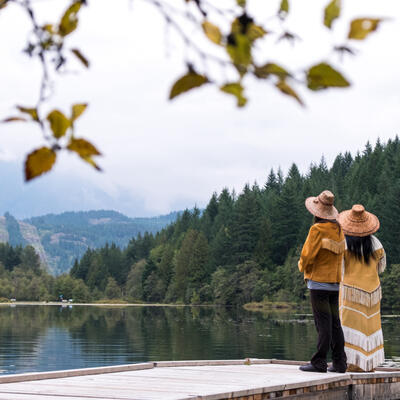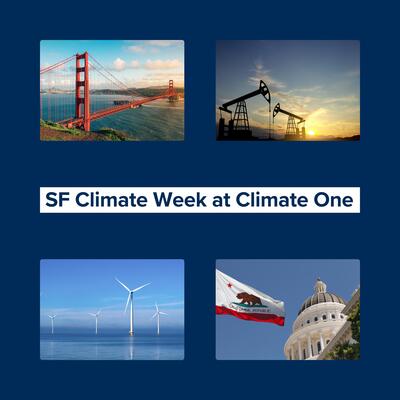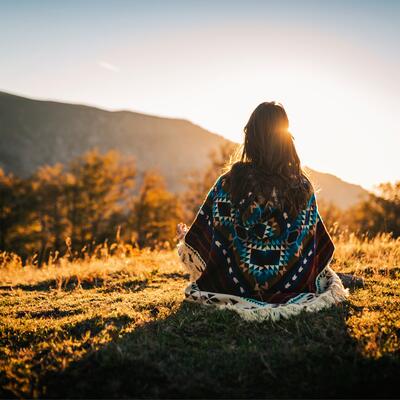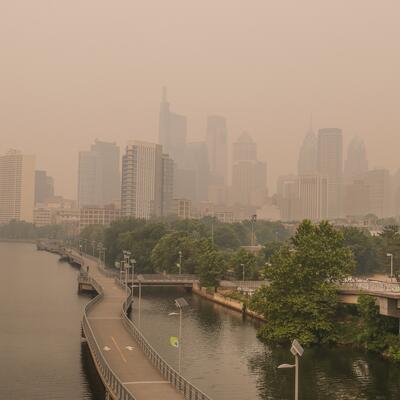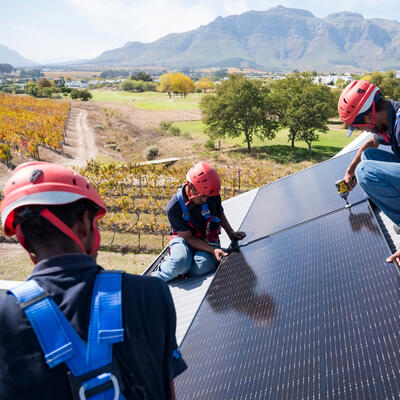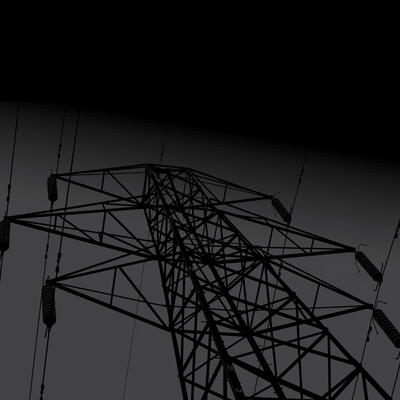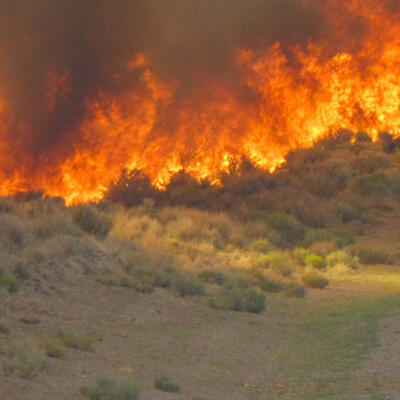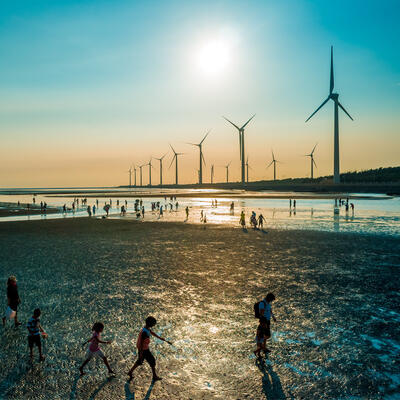
Fast, Fair and Clean: The New Energy Transition
Guests
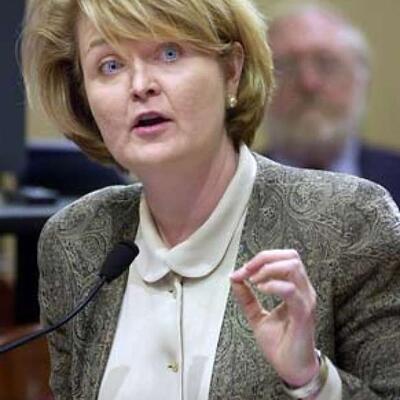
Loretta Lynch

Jeremiah Baumann

Paula Glover
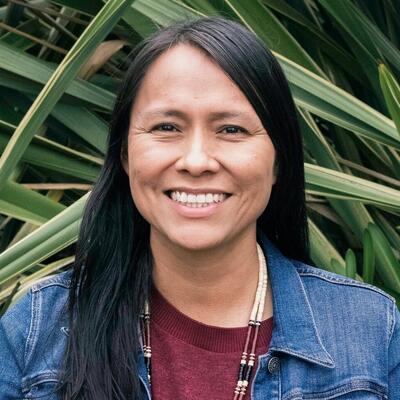
Wahleah Johns
Summary
Hopes and expectations are high for President Biden’s first weeks in office. His recovery plans promise to take on COVID-19, a battered economy, and a rapid clean energy transition in a way that doesn’t leave communities behind. But Navajo Nation, which until recently was home to the largest coal-fired power plant in the U.S., has been left out of economic and energy plans for a long time.
“The community that has been the provider is the one that has the most homes that don't have access to electricity,” notes Wahleah Johns, co-founder and Director of Native Renewables, which provides power to homes on the Navajo and Hopi reservations.
Nearly a century ago, the Rural Electrification Act of 1936 sought to reduce the disparities between urban and rural access to electricity. But the program excluded many of the first Americans.
“It's 2021 and we still have a lack of infrastructure to tribal nations,” says Johns, “we’re still the forgotten region to get access to power and infrastructure and funding.”
This narrative of exclusion resonates with Paula Glover, former President and CEO of the American Association of Blacks in Energy. “There are other communities as well who also do not have access to electricity and clean water,” she says, “and they are Americans who have been forgotten, and many of them are black and brown and native.”
Now serving as President of the Alliance to Save Energy, an industry group, Glover believes that public policy needs to recognize that every community needs something different. “Before we invest in any other thing,” she insists, “we should be helping people maintain their quality of life and/or increase their quality of life, while at the same time using less energy.”
Loretta Lynch, a former President of California Public Utilities Commission, agrees with the community-first approach, but insists regulation is key to making the correct economic and environmental choices.
“Decentralization with regulation is the way to go,” she explains, “The Feds could continue to make smart, localized, clean, and green choices, and allow the local communities to implement those choices -- just like they do in health, just like they do in welfare, just like they do in education.”
Related Links:
Alliance to Save Energy
American Association of Blacks in Energy
California Public Utilities Commission
Energy Innovation
Native Renewables
Full Transcript
Greg Dalton: This is Climate One. I’m Greg Dalton. [pause] Hopes are high for the Biden administration to move fast on a clean energy transition.
Loretta Lynch: Nobody gets to say, "Yeah, we're gonna stay on coal." That won't work for climate, it won't work for the United States anymore.
Greg Dalton: But when some areas of the country, like Navajo Nation, don’t have consistent access to electricity, where do we (even) begin?
Wahleah Johns: The community that has been the provider is the one that has the most homes that don't have access to electricity that doesn't have access to water or connectivity.
Greg Dalton: Can the incoming administration improve energy access for all Americans, while phasing out fossil fuels?
Paula Glover: Before we invest in any other thing, we should be helping people maintain their quality of life and/or increase their quality of life, while at the same time using less energy.
Greg Dalton: A fast, fair and clean energy transition. Up next on Climate One.
---
Greg Dalton: What will it take for a rapid transition to clean energy that doesn’t leave communities behind? Climate One conversations feature all aspects of the climate emergency: the individual and the systemic, the exciting and the scary. I’m Greg Dalton.
[SFX explosion]
Greg Dalton: In December 2020, the three massive smokestacks at the largest coal-fired power plant in the west, the Navajo Generating Station in Arizona, were demolished. The plant had employed about 750 people, nearly all Navajo and Hopi, before going dark in 2019.
Wahleah Johns: We’ve lived in those shadows of those towers. And the shadows were higher asthma rates, degradation of water quality and a lot of people not benefiting from this industry.
Greg Dalton: Wahleah [Wah-HAY-lah] Johns is co-founder and Director of Native Renewables, which provides power to homes on the Navajo and Hopi reservations.
Wahleah Johns: We believe that home is the most precious place for our people and we see solar and the sunlight helping to strengthen our home.
Greg Dalton: She’ll join us later in the program, along with Paula Glover, President of the Alliance to Save Energy and former head of the American Association of Blacks in Energy. And Jeremiah Baumann, Director of Federal Policy with the research firm Energy Innovation. First… As we enter the new Biden-Harris administration, what are the biggest opportunities to quickly decarbonize the American economy?
Loretta Lynch: Decentralization with regulation is the way to go.
Greg Dalton: Loretta Lynch is Former President of the California Public Utilities Commission and an energy consultant. She is unequivocal about the need to move away from energy that is dug out of the ground.
Loretta Lynch: We have to make choices. We cannot afford either economically or environmentally to continue to buy and use fossil fuels to produce electricity and heat our homes and businesses. And until we make that choice and stand by the economic choice and the political choice. We will never actually attack or address climate change. So that means in practical terms no more fracking. The Biden administration must ban fracking in the United States. That means no more coal. That means no more liquefied natural gas or LNG. No more. And that also means no big grid. Instead, we need local and sustainable solutions that are community-based that are designed for each and every community and community driven. But because community driven means we will actually deal with the undealt with environmental justice implications of our big grid big energy fossil energy choices of the past. But we can only allow those local community driven solutions that are clean and sustainable. Nobody gets to say, yeah, we’re gonna stay on coal that won't work for climate, it won't work for the United States anymore.
Greg Dalton: That’s okay in states where there's no coal, but in Wyoming, West Virginia, Illinois there’s coal states in this country where what you just said means is a threat means it’s gonna hurt people who directly work in the coal industry and people who indirectly benefit from those jobs and that activity. So, what do you say to that displacement?
Loretta Lynch: I say it's the same as when we had horse and buggy manufacturers and people who tended horses. We couldn't have a parallel system of horses and cars we had to choose because horses and cars together were a recipe for disaster. So, what do we do? We made sure that the carriage manufacturers started working in car plants. The people who made seats for carriages made seats for cars. The people who made bodies for carriages made bodies for cars and the people who tended the horses got retrained to do something else. We cannot continue to have coal and solar because coal doesn't work. Coal is the horse and buggy of the 21st century except it's also destroying our planet unlike the horse and buggy. So, just like we have to fundamentally rethink the horse and car transition. We now need to fundamentally rethink the car and coal transition.
Greg Dalton: And all those solutions you suggest are all on the supply side. Ban fracking do away with coal. We should clarify that fracking is done for natural gas and fracking is also done for oil for liquid transportation fuel. But if you ban fracking for oil that doesn't reduce the demand. The oil will still be supplied from somewhere. Perhaps Venezuela from some foreign country that is hostile to the United States. So, it's great to ban fracking might make some environmentalists feel good it doesn't really solve the problem because people are still gonna drive their cars. The demand is still there.
Loretta Lynch: Sure. And so, we obviously have to have demand-side solutions as well. I have solar on my house. I should be able to plug my electric car into my house and give back to the grid when the grid needs the electricity for the house and take from the grid when I need electricity for the car. Right now, the way the pricing works with my local utility it doesn't incentivize anyone to do that. We should be changing our utility pricing structures to be able to allow that kind of demand resource flexible demand resource to happen and that's on the personal level and is also on the community level. But, you know, if we ban fracking, we’re also gonna lower the risk of earthquakes because clearly throughout this nation people had to confront the previously unconfronted or had to confront problem of earthquakes based on what’s happening in the ground because of fracking. So yes, we have to deal with supply. We also have to deal with the demand. But we are going to transition in this world, from fossil to renewable sources. The only question is how long it’s gonna take us how expensive is it gonna be and how hard is the transition gonna be. And the transition is harder if you continue to allow horses next to cars. The transition is harder if you continue to allow LNG next to solar.
Greg Dalton: Though if you look at decarbonization which parts of the U.S. economy are decarbonizing and getting cleaner. The electricity sector is a better new story than the gasoline mobility sector, right. And I think and look at that as well one reason may be because it's more decentralized it’s regulated largely at the state and local level it’s less concentrated. The auto industry, the oil industry has more concentration of power it’s more federally regulated, where they can have more influence. So, would you buy that thesis that decentralization and is helpful to decarbonizing and that electricity is getting cleaner faster than personal mobility?
Loretta Lynch: Decentralization with regulation is the way to go because it's not just magically that the electric sector is relatively doing better than the other sectors. It's because it's state and city mandates for them to do better. They’re not doing it out of the goodness of their heart. They are doing it because they are statutorily mandated to do it in the states that they are mandated to do it. So, the regulation part of that at the state and local level I would argue is the key. But also, the fact that there’s public ownership is now more and more the key in the areas where there is public ownership in the Northwest. In some cities throughout the country where we had municipal power is getting greener all the time because they see the climate change impacts of that. And even the Navy is getting greener because they see the cost the economic cost of not addressing climate change. So, I agree the Feds are let's just say asleep at the switch and certainly asleep at the climate switch even under Democratic administrations. And that's better than actively dismantling all environmental protections as we seen in the last four years, but being asleep at the switch and letting the companies do their own thing is no longer a viable solution if we want a viable planet.
Greg Dalton: Infrastructure seems one area where Democrats and Republicans can craft a bipartisan deal. The electric grid could be part of that transportation roads and we have crumbling infrastructure in this country. What would you like to see as part of an infrastructure deal to move toward a cleaner economy?
Loretta Lynch: I'd like to see a decentralized but regulated electric grid. And the reason is you have to choose. The Biden administration is facing fundamental historic choices that we have not had for 100 years. And the choice is you either go green or you don't. Halfway is not enough. And so, a big grid with the federal government takes over the entire grid planning and there is no room for local and environmental justice solutions is a grid that is really going to allow coal and natural gas and fracking and LNG to exist for longer than they are economically viable. Because a big grid will allow them to find more markets for their coal and their LNG at a time when we need to be cutting them off and not providing more markets for them to access.
Greg Dalton: Well, one reason that people favor sort of the national solution because of the coffers of Uncle Sam. Federal dollars are required that local communities can't afford some of these investments and they worry about increasing costs. But how can we go greener without raising utility costs, for as we’ve heard earlier in this episode, people who can least afford to pay.
Loretta Lynch: Well, number one if we really had a free market solar and wind and battery storage would be cheaper than coal and LNG and nuclear. Those are all heavily subsidized on the tax side and heavily subsidized from the federal government. So, they appear cheaper in some markets, but they're not cheaper to produce. It’s because they get all these incentives, out and out subsidies, and tax advantages that they have been historically cheaper. But if we had a fair fight in terms of what are the costs of these various energy production solutions, wind and solar and batteries would win every single time now, every single time as well as geothermal. So, the federal government can still pay for things but not have to control them. And the best example of that is in education. We still have local school boards and we still have state policies, but a whole heck of a lot of that money is coming from the Feds. The Feds could continue to make choices smart localized clean and green choices and allow the local communities to implement those choices. Just like they do in health. Just like they do in welfare. Just like they do in education.
Greg Dalton: So as you look at the new Biden-Harris administration it’s very early days they have some policies, plans don’t really have their team in place yet. How are you feeling about how ambitious they will be because you say they need to be more ambitious than Obama was when VP Biden was the vice president?
Loretta Lynch: Well, just as the vice president as VP Biden pushed former Pres. Obama to get into the 21st century, when it came to things like equal marriage. Hopefully he's also going to be pushing himself into the right solutions economically. And so, I have great hope but we need to trust but verify. I'm thrilled that Jennifer Granholm is going to be the head of the Department of Energy. I think she is a climate visionary, but where the pedal gets put to the metal is where and who are the nominees for the Federal Energy Regulatory Commission. And the other very key jobs within the Department of Energy and throughout the interior EPA to see where who is going to implement a real climate first policy. And I am most heartened by Pres. Biden's focus on environmental justice and his commitment to environmental justice. So, the early policies and the early people he puts in place to implement those policies are gonna tell the tale whether it's talk or action. But I am very optimistic that we are going to have for really the first time in any coordinated and major way a focus on environmental justice when it comes to energy and the environment.
Greg Dalton: Loretta Lynch is Former member of the California Public Utilities Commission and an energy consultant and expert. Thanks for coming on Climate One.
Loretta Lynch: Thanks for having me, Greg.
---
Greg Dalton: You’re listening to a Climate One conversation about a fast, fair, (and) clean energy transition. Coming up, using technology and expertise to improve energy access for everyone.
Jeremiah Baumann: The energy policy world tends to be dominated by highly technical sort of policy wonks who are trying to balance electrons on the grid and kind of with a sort of perfect metric and market for reducing carbon without taking other values into account.
Greg Dalton: That’s up next, when Climate One continues.
---
Greg Dalton: This is Climate One. I’m Greg Dalton, and we’re talking about how to ensure a fast and fair transition to clean energy. Nearly a century ago, the Rural Electrification Act of 1936 sought to reduce the disparities between urban and rural access to electricity. But the program excluded many of the first Americans.
Wahleah Johns: It's 2021 and we still have a lack of infrastructure to tribal nations. You know, we’re still the forgotten region to get access to power and infrastructure and funding.
Greg Dalton: Wahleah [Wah-HAY-lah] Johns is co-founder and Director of Native Renewables, which provides power to homes on the Navajo and Hopi reservations. About 60,000 indigenous people across Arizona, New Mexico, and Utah - don’t have electricity in their homes.
We talked about improving energy access for all Amrricans along with Paula Glover, President of the Alliance to Save Energy, an industry group, and former head of the American Association of Blacks in Energy. And Jeremiah Baumann, Director of Federal Policy with the research firm Energy Innovation, and a former aide to U.S. Sen. Jeff Merkley, a Democrat from Oregon.
Wahleah Johns: Most of the infrastructure that was put in America with energy and transmission has been paid for by the federal government. But this energy transmission has provided power to the rest of communities in America that are predominantly non-native. And I think that's the, you know, the action is what we see and if the federal government can push for building dams and creating canals hundreds of miles and transmission lines from three states over to power, you know, municipalities like Phoenix or Los Angeles or San Francisco. We can provide power for these rural areas that are populated by indigenous people and tribal nations.
Greg Dalton: I read that 75% of the 15,000 unelectrified homes are in Navajo nations. What was your access to water and electricity growing up on the Navajo nations near Winslow, Arizona?
Wahleah Johns: So, my father was able to get a home and Winslow's located right outside the Navajo nation reservation and it’s a border town. And that's where he went to school and so he was able to get a house there and we were able to go to school there. But before that we were on our reservation and went to boarding schools and that was pretty much the only schools that exist. But my parents live on the reservation right now they don't have electricity or running water. So, I wouldn't say like we actually are there yet and so, you know, and they’re one of thousands of families that don't have access to power and water. They haul water every other day and right now they use solar generators to help power their lights. But we live about 3 to 4 miles from a transmission line and to be able to put a transmission line to come up to our home it’s about $27,000 per mile. And a lot of times we are the ones that have to foot the bill and we don't have that type of capital. And I think this is the challenge is the affordability when it comes to power, but on top of that we have design off grid solar and battery storage solutions and still it's you know high and pricey for families that live in rural Navajo nation.
Greg Dalton: Yeah, that’s how you’re changing the narrative by founding Native Renewables with other Navajo women. So, tell us about how you’re empowering yourselves using clean energy.
Wahleah Johns: So, off grid solar and battery storage is a unique package. I think it's taught us the technical side of how we want to or we want to educate around this technology for the users and customers, but the limitations that it also has to live off grid. And all of our education has been done in our language and culturally sensitive to our people so they understand. So, a child to an elder can understand the limitations to off grid solar it’s not like grid tied. And we do this because we want the product to last 20 to 30 years and you know it's been really fun. We've been able to build a lot of good relationships with a lot of these families that live in these remote locations that don't have access. So, it's made us I guess understand better the needs and understand our community more in a way that we can be of service. And I think that's been the most rewarding part of it. And we all a lot of our employees grew up without electricity and running water. So, we understand the challenges and have created the solutions that fit you know our family's needs. And we believe that home is the most precious place for our people and what we are trying to bring is stability and strength. And we see solar and the sunlight helping to strengthen our home and we had this beautiful value around it’s called "hózhó" which means balance and harmony. And that's our goal in life as indigenous people as Navajo people is to have always balance and harmony surrounding us beauty surrounding us always. And with this concept we built this program called “hózhó homes" which is to bring that balance and harmony into home and using this renewable energy and sunlight that you know blesses us every day on the Navajo nation. We get over 300 days the sunlight. So, it's a pretty remarkable program and initiative and our people on the ground are spectacular. And they're all Navajo women and Hopi women and men as well.
Greg Dalton: I’ve learned a lot about indigenous culture in the last year and been embarrassed and ashamed. A gaping hole in my education and my understanding and ignorance frankly. And when I read your article in the New York Times very eloquent about your personal story. There was a part in there that said, it's not because we choose this traditional lifestyle or culture that we live in energy poverty. This is not our choice. I’d like you to elaborate that some people may hold that view that, oh, you’re choosing to live that way it’s not that the U.S. government intentionally excluded delivering basic services to your nation that it gave to everybody else.
Wahleah Johns: Yeah. I mean I think that's the, you know, with this pandemic hitting us much harder than and disproportionally harder than other communities. It raised the visibility even more of the lack of water and infrastructure connectivity and power. And there is a lot of surprises, you know, it was on national television like oh my gosh, these people, you know, they don't have these basic infrastructure and that's good but it's also like there's a deeper story here that talks about our history and us being pushed as tribal nations throughout the United States to be on reservations and the economy that is there for you is extracting your natural resources. So, we have hundreds if not thousands of uranium mining mines that have happened over the course of 50 to 60 years. We have you know five large coal-fired power plants that are located on and near our Navajo nation in the past 50 years, oil, gas development, I mean this has been kind of the bread and butter of most tribal nations is extracting their natural resources fossil fuels to generate jobs to generate revenues. we haven't been given the freedom to design the way that we go about our policies with economic you know transition or do it in a way that fits our needs as people. And I think that's the opportunity now and we learned a lot from the extraction that has happened in our lands and irreversible damage that has happened to our aquifers and the health of our people. And I think that those are lessons that we can take to help shape an economic policy planning for a transition to good I guess “hózhó” lifeways. And that's been like our goal as people and I think there's so much opportunity to cede those ideas and water them.
Greg Dalton: Paula Glover, I’d like to ask you another story about racial scrutiny and then empowerment in the energy arena. In 1977, President Carter convened a meeting of energy experts. No people of color were on the original invitation list. Who is Clarke Watson what did he do when he heard about that all-white meeting?
Paula Glover: So, Clarke Watson, who was actually the founder of the American Association of Blacks in Energy which is an organization that I had the pleasure of being the CEO for eight years but also, I’ve been a member of that association for now 27 years. And so, what Clarke did was really bring together African-Americans who actually were currently working in the energy business and African-American leaders because he was really strategic and very thoughtful about his choices. He understood the dynamics of how Washington worked and that you know title who it is where they work, what they do all of that stuff kinda matters when you're trying to gain entry way into right policy spaces that had been closed to you in some way. And he created the Association 12 members initial family members, only one of whom is still with us today. And I've been blessed to have known 10 of those 12. So, I’ve been very lucky that I got to know these men and women. But it was founded really to educate and inform what I would describe the intersection between public policy energy policy andon African-American communities and low- and moderate-income communities. And I think a lot of what Wahleah shared about native communities as we’ve seen that on black and brown committees in energy across the country for decades. And it still exists and I've heard that story before and the first time that I heard the story of 15,000 Navajo not having electricity, it literally broke my heart. But there are lots of other there are other communities as well who also do not have access to electricity and clean water. And they are Americans who have been forgotten, and many of them are black and brown and native. And we assume I think that all of our communities experience our industry in the same kind of way and have the same needs and just, you know, from the work that I'm doing now even at the Alliance when you start talking about public policy, there needs to be a recognition that every community needs something different. And so having a one-size-fits-all answer or deciding that we’re gonna give everybody the same thing and those communities that have been under invested in or not invested in for again generations will all of a sudden magically catch up. None of that really happens and I would challenge all of our associations and all of us who do this work, that that's what we should be insisting upon. We don't, which is why we have results that we have, but I think we should. I think that’s just the right thing to do, right. Focus on those who need it the most and the rest of us will be okay. And focus on the economic impact, right. Somebody makes money.
Greg Dalton: Jeremiah Baumann, you’ve worked in energy for U.S. Senate for Bloomberg. Does that happen in the energy world do people think of people color first, what’s your perspective in what we’ve been talking about?
Jeremiah Baumann: I think there’s just a profound need to not just think about communities of color first, but think about these issues thoroughly in over the course of history as we’re doing here today. And I wanted to start with that because, no, the answer to the question is no, most energy policy work across the board in this country hasn't approached it that way. I'm just really struck and reminded by the deep and long history of these problems. I spent years in the Senate working with four native nations in Northern California and Southern Oregon who had the federal government and private utilities come in and build dams that destroyed their fisheries. And that wasn't the end of it. They lost the title recognition in the 1950s some of them didn’t regain it to the 1980s. One of them had most of their land taken away by the federal government which turn around and made hundreds of million of dollars harvesting timber on it that happened in the 1970s. Just years ago, we saw communities, Flint of course, the most high profile where low-income people of communities of color are losing their access to water today. These are really profound problems and they’re thorough they’re deeply embedded and they go back for hundreds of years. So, that’s where we have to start and know the energy policy world has not usually thought about these things this way. In some ways it’s the opposite the energy policy world tends to be dominated by highly technical sort of policy wonks who are trying to balance electrons on the grid and kind of with assertive perfect metric and market for reducing carbon without taking other values into account. And that's really part of what we have to reverse. I also want to emphasize that you have to also put in place specific policies about justice and equity. You have to not just make sure that you’re figuring out how to do clean and renewable energy and save energy in a way that embraces equity. But you have to look at how does EPA and Department of Energy Policy overall what kind of equity and justice. And how to make sure that we are cracking down on the pollution of our air and water that has for decades for centuries just proportionally affected native communities, communities of color. And this is really a pivotal moment because for the first time ever, those values are at least being attempted to be baked in the federal policy by a new administration that’s about to take office.
Greg Dalton: And federal personnel to lead the U.S. EPA. President Biden nominated Michael Regan who will be the first black man to run EPA as the top environmental official for North Carolina. Paula Glover, what hopes do you have with Michael Regan to both rebuild an EPA that’s been decimated and to really address deliver on these campaign promises that are easy to make and harder to implement.
Paula Glover: Yeah, I mean, I’m actually very helpful and I was really pleased with his choice for EPA. And particularly because I think Mr. Regan had a specific set of experiences that’s very unique coming out of North Carolina. I think my concern is always particularly around energy policy specifically is that those people who don't have a voice are always the ones who have to pay for it. And those people who can pay for it never have to pay for it. And so, addressing climate change for these communities should be top of mind because they are impacted the most. But I don't think they should just -- we shouldn’t just be talking about the environment and not talking about economics with those same communities. And how we creating opportunities for the people who live in those communities to more fully participate in this economy that we’re building. It's the one sidedness of the conversation that would make me worry because I would say while we've address climate change from a health and pollution perspective, which I think is important. But if that same community if their bills are going to increase 10, 20, 15% and you have not created an economic opportunity for their businesses or for people to work in those jobs that pay enough so that they can absorb these costs. Then we actually haven't done anything good to them. That to me is worrisome.
Greg Dalton: Wahleah Johns, I’d like to hear your thoughts on this moment of transition with the new administration coming in. Is this a moment of hope and opportunity or you’re kind of wary and skeptical, you know, I’ll wait-and-see until they prove it?
Wahleah Johns: I am very hopeful about I mean the idea to put 40% of investments into environmental justice communities is spectacular. To me, I mean, I haven’t heard of administration really focused on environmental justice and I think communities that have been affected by industries and pollution and helping with the transition. you know, coming from a front-line community I live 2 miles from a coal mining operation that just closed last year. And we're in a deep need for transition support from the federal government from state governments to help our economy that was, you know, 35 to 40% of our revenues for our nation and for the Hopi nation it was 80% of their revenues from this coal mining operation. And I think that's the, you know, part that we don't see too much support or offering to help our nation in a transition where we supplied over 5 million people with their energy needs for 50 years and yet you know the community that has been the provider is the one that has the most homes that don't have access to electricity that doesn't have access to water or connectivity. You know, we need support for a transition.
---
Greg Dalton: You're listening to a conversation about a fast and fair transition to clean energy. This is Climate One. Coming up, making sure communities have a stronger voice in their own energy planning.
Paula Glover: Before we invest in any other thing, we should be helping people maintain their quality of life and/or increase their quality of life, while at the same time using less energy.
Greg Dalton: That’s up next, when Climate One continues.
---
Greg Dalton: This is Climate One. I’m Greg Dalton. We’re talking about improving energy access in communities across America with Paula Glover, President of the Alliance to Save Energy. Jeremiah Baumann, Director of Federal Policy with the energy research firm Energy Innovation. And Wahleah Johns, co-founder and Director of Native Renewables. I asked Wahleah for her thoughts in response to the demolition of the iconic towers at the Navajo Generating Station.
Wahleah Johns: We’ve lived in those shadows of those towers. And the shadows were higher asthma rates, degradation of water quality and a lot of people not benefiting from this industry. And I think the relocation of thousands of families as well and the deceit that went behind the transactions for Peabody coal company to extract coal from our homelands. And, you know, I noticed it last year in August in 2019. I noticed the closure because the mining is 2 miles away from me and the machines stopped operating. We hear the machines night and day for many years and it was nice to finally hear it be quiet at night. And that was my moment of like wow, she's finally going to get some rest. And when I say she, I refer to our homeland as a female mountain. And it was like kind of a relief for her because we say that the coal is the liver of her. And the more that they extract coal, you know, it's gonna weaken her system. And I think that’s the, you know, connection that most indigenous peoples have to their land base is this traditional ecological knowledge. And we have definitely had that and to see or to feel the stopping of mining in 2019 was like was really like for me it was just like wow, finally, she’s gonna get a rest. But, you know, with the smokestacks coming down, I mean, to me was just a clear indicator that what's next and making room for opportunities for the Navajo nation the Hopi nation to sell clean power on the existing infrastructure that is there. We have thousands of miles of transmission that comes from these power generating stations that go to Los Angeles that goes to California that has a clean energy appetite. It goes to Nevada and Phoenix but also New Mexico and I think those are the opportunities where we can use existing infrastructure and reclamation lands to you know go solar utility scale and put clean power on there. But again, this kind of concept of just transition has to be led by people on the ground by the communities in working in partnership with solar developers, but also on tribal nation. And many times, there is disconnection between the local and the national tribal governments and I think that you know there's been a lot of good learnings of how we can do that together to you know build a plan that is going to be healthy for our nation. And so, I see a lot of opportunity in the closure of Navajo generating station.
Greg Dalton: Right. Particularly some energy companies come in and with solar and wind to replace the coal and do so in more equitable and just terms is what I’m hearing. So, that’s not a repeat of the history your people have seen again and again and again.
Wahleah Johns: Yes. I mean I think that with solar developers, many of them don't understand tribal sovereignty don't understand the politics and the culture the history and maybe see it as a business opportunity only. And it's no different than, you know, a fossil fuel company coming in and we need to change the culture in this transition. That there needs to be benefits to the community and there's also needs to be an ownership stake and leadership and investment in the local communities to make sound decisions that are you know consensus based but also everyone is well-informed in where they're moving together.
Greg Dalton: Jeremiah Baumann, we’ve heard about 750 people losing their job at the Navajo generating stations. There are 300,000 energy efficiency workers unemployed oil companies have laid off hundred thousand workers, some of that is COVID some of that is because of things that preceded and bigger than COVID. Job retraining, helping workers is often talked about in this country. Hillary Clinton says the biggest mistake she made in her 16 campaign was talking about putting coal companies and workers out of business. Do we ever get it right in this country in helping those kinds of people it’s talked about but, you know, is there an effective policy for helping these people that will be displaced by a transition away from fossil fuels?
Jeremiah Baumann: Well, you’re definitely right that we don't have a very good history of this. We don’t generally have a very good history of taking care of not just communities of color, but working-class families and workers in general. If you look even at issues that aren’t directly energy-related the way that trade for example, has reduced manufacturing in the U.S., European countries do a much better job taking care of the workers and families that lose manufacturing jobs than the U.S. does which we’re looking to some of those examples for how we help workers and communities in transition. I’d also really point to the number of things we should be doing that ought to work a lot better. One thing that Wahleah mentioned in passing I wanna really point out is this notion of bottom-up economic planning and listening to the community about what's going to work in their community to create jobs in that community. And not just having people think that they can write a smart five-point policy plan it'll magically help hundreds of thousands of people around the country. I think we have to listen to the communities and then think about state-by-state industry by industry, community by community just what are the right opportunities because there are as Paula talked about so many opportunities to own new businesses to own new opportunities in this clean energy economy. It’s not just about who's going to get the job drilling a geothermal well or installing a solar panel it’s about who’s gonna own the businesses. Are there gonna be new manufacturing facilities around the country seeing living wage jobs building everything from electric vehicle infrastructure to components for electric vehicles to other new clean energy technologies. That’s about looking at just a lot of these communities are well positioned for jobs in the economy of the future as Wahleah is talking about the Navajo nation has the infrastructure to be a new solar energy capital of the Southwest. A lot of the oil and gas communities in New Mexico and Texas those workers are incredibly well-positioned to do everything from clean up the oil and gas wells that have in many cases been abandoned. This is something that Vice President-elect Harris and President-elect Joe Biden have been very interested in cleaning up those wells. Similarly cleaning up coal mines in a lot of cases it’s very similar skills to the mining or the drilling to begin with. Geothermal is an opportunity to use drilling techniques but for clean renewable energy that doesn’t pollute the community. So, you’ve got to be thorough about this stuff and look at all the opportunities but again, really work with the communities to make sure you’re building a program that will work for them.
Greg Dalton: It’s interesting the New York Times recently did a story about college students planning to go into geology, in the oil and gas industry and one of them said, jobs are starting to crater and the people, these students are taking on debt planning on this career they thought they were gonna have in oil and gas with these incomes. And one of them said, well, if I can’t make it in oil and gas I’ll pivot to geothermal because I’ll be able to use my skills and rather than, you know, suck out oil and gas we can take out heat. Paula Glover, I’d like to get your thoughts there on this transition. And I’ve heard from other people reporters at Bloomberg and elsewhere that actually the fossil fuel industry is more diverse and inclusive than the clean energy industry. So, your thoughts there on sort of the job path and the transition from fossil to clean.
Paula Glover: Yeah, I think, you know, there is a lot of opportunity from fossil to clean and you know this because so many fossil fuels or a good number of fossil fuel companies actually have clean energy businesses. There's a reason right for that. And so, in the larger narrative, right, I wouldn't count out our big Chevrons and BPs and Shells of the world. They've been pivoting and they’re continuing to pivot. They don't have plans to go out of business they understand that we’re going in another direction and wanna be a part of that. And so, creating opportunities –
Greg Dalton: Shells and BP faster than Chevron. I think European companies are moving faster than local ones.
Paula Glover: Yeah, absolutely. But I think, right, yes, oil and natural gas is more diverse than clean energy. That’s actually to the numbers tell you that but nobody is actually really diverse enough, right. If you look at the percentage of people of color in the workforce and then you overlay that where we’re represented. Best thing utilities is probably at that 10, 11% that's probably the closest to what it’ll be versus actual population. And then it goes down and so oil and gas may be in the 7 to 9% range the clean energy is in the 4 to 6% range. So, it is true but clean energy is also new, right. So, it’s a much bigger opportunity and I think for clean energy companies to be thinking about how they integrate not only workers who are leaving fossil fuels but have the skill set, right. Recognizing that people have a skill set that's transferable but also, I think more importantly to Jeremiah's point is how we integrate that community in our planning from the very beginning because we've never done that before. And part of I think the risk with that to be honest with you is that what the community says they want may not necessarily be what we think they should have, right, as the company who's kind of starting that conversation you have to figure out are you going to be okay with that, right. It's really very simple. When you allow the community to drive the decision-making, then you don't get to pick what the result is what they choose. I have no idea I would say because I work for the Alliance to Save Energy that the first stop is energy efficiency, right. That before we invest in any other thing, we should be helping people. One, maintain their quality of life and/or increase their quality of life while at the same time using less energy. And there's lots of technology that would allow us to do that if we have the proper incentives for people to make those investments. And when we’re talking about disadvantaged communities a lot of that has to do with program design. It has to do with recognizing that the infrastructure is not the same as disadvantaged communities that they are going to need more that you can't just say I'm gonna have a weatherization program going there and everybody is gonna take advantage of it and it's all good. It doesn't work that way because if I have it had investment in my home or my community. I can't just, you know, add a thermostat and it's fine. My husband and I live in a home that's almost 100 years old. I cannot put a smart meter in this house, right, before doing a whole lot of other investment in my house because my house is just too old it's not built for that. And yeah, we can afford to take care of our house but imagine someone who's just trying to make it and then we want to make these investments. So, I think you know we have to think holistically about, right, what the community needs and hear from them what their priorities are and then begin to chip away with it. And so, I think even when we talk about workforce development in communities, we need to understand what the landscape is in that particular community and see where are the other investments or other organizations who’d be able to support us in the process. So, that we doing the right thing by people and not expecting people to make their own way because we've kind of put some stuff out there and as long as you know how to navigate the system, you'll be alright. Like to me that’s kind of the system we have set up and that’s the system that I would want to break.
Greg Dalton: Wahleah Johns, I’d like to ask you about the nomination of New Mexico Congresswoman Deb Haaland for U.S. Sec. of Interior. If confirmed, she will be the first Native American to preside over America’s vast public lands and national parks. What’s the significance of that milestone and what do you hope she would bring?
Wahleah Johns: I think it's wonderful that she was nominated and I 100% support that idea. In all of my work, I would say over 25 years my letters to the federal government were to the Secretary of Interior. So, I know all the past 20 years interior secretaries. So, to write a letter to Deb Haaland as a Secretary of Interior would be amazing just because there is, you know, the story of Black Mesa who could reverse to support restoring our water that was damaged by Peabody coal companies pumping is the Secretary of Interior. They have that one authority and so that you know since I came into this movement about 25 years ago to protect our water the Navajo aquifer. I understood this language as the leases were being negotiated between the interior and Peabody and tribal nations Navajo and Hopi. And so, you know that was our main push was to get the Secretary of Interior's attention to restore and replace the water that has been used by Peabody coal company and for the companies to be accountable for their cleanup. And today we’re still going to be pushing that and I think to, I really had an emotional moment when she was selected because it also showed me I think that you know you heard about when Obama got elected, there was this moment where I was like wow like someone of color this is amazing. And just like really overwhelmed with joy. And I think that's the same feeling that I had for a Native American woman to be in this position a cabinet position for myself but also for my daughters to see that it is possible that we can be in these positions as native women. And the other piece is that previous to, you know, colonization here in the United States the land managers where women. And everybody that is indigenous understands this mountain the water and can still have they hold those wisdom that is so needed even to, you know, it's not just lands it's something deeper than that and, in our language, too. And I think Deb's going to bring this perspective and the teachings that she comes with is that caretaking of land. You know, and I think that's pretty phenomenal and I'm really excited about her position and I think it's gonna be good for our homelands.
---
Greg Dalton: Wahleah Johns is co-founder and Director of Native Renewables. We also heard from Paula Glover, President of the Alliance to Save Energy and former head of American Association of Blacks in Energy. And Jeremiah Baumann, Director of Federal Policy with the research firm Energy Innovation.
Greg Dalton: To hear more Climate One conversations, subscribe to our podcast on Apple, Spotify or wherever you get your pods. Please help us get people talking more about climate by giving us a rating or review. It really does help advance the climate conversation.
Greg Dalton: Kelli Pennington directs our audience engagement. Tyler Reed is our producer. Sara-Katherine Coxon is the strategy and content manager. Steve Fox is director of advancement. Devon Strolovitch edited the program. Our audio team is Mark Kirchner, Arnav Gupta, and Andrew Stelzer. Dr. Gloria Duffy is CEO of The Commonwealth Club of California, where our program originates. [pause] I’m Greg Dalton.
